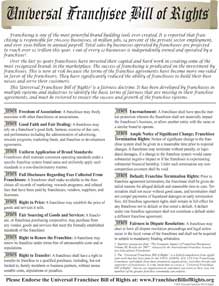The Universal Franchisee Bill of Rights (UFBOR) was released in August 2011 and to date has over 1,200 franchisees, friends of franchisees, and franchisee associations that have endorsed it. The UFBOR was created by franchisees for franchisees as a fairness doctrine, and the goal was to highlight the imbalance in the relationship between franchisees and the franchisors because of onerous franchise agreements.
Click here to download a copy of the Universal Franchisee Bill of Rights
Franchising is one of the most powerful brand building tools ever created. According to The Economic Impact of Franchise Businesses: Volume III, franchised businesses operated over 828,000 establishments, directly provided more than 9.1 million jobs, and met a $304 billion payroll in 2007. Specifically in Maine, franchise businesses directly accounted for 38,900 jobs, and indirectly accounted for 74,100 jobs in 2007.
Many people shared their own stories at http://franchiseebillofrights.org/ dealing with unfair franchisors. “My wife and are are having a heck of a time with a new franchisor who hasn’t kept their end of the deal at all. It’s been a huge mistake spending thousands on legal fees. This franchisor is a joke. They have no outline for ongoing support or anything. I just can’t believe how bad it’s been — not the business, but the franchisor,” one anonymous commenter posted.
Another anonymous commenter delved even deeper into his problem. “I remember this site when I was an owner of a franchise. It appears it is trying to balance between complaints and advice. Both are reasonable attempts at trying to make sense of the one sided abuse that franchisors can heave on someone. This is not to say they all do that, as I still own another one, but there are some that are really abusive. The real problem is that you have zero rights. I am not an inexperienced business person. I have actually been very successful. I did lose my entire life savings defending an impossible situation, and the problem was that the court system allows false accusations, and you have to defend against them all. No way should businesses be run like the mafia. I really hope something can be done about this.”
Jim Coen, currently the Executive Director of the Maine Franchise Owners Association (MFOA), was co-chair on the committee that wrote the UFBOR. According to Coen, the UFBOR is an important document. “It really does define the trials of being a franchisee.”
According to Coen, countless hours were spent deciding the most important aspects to pull the UFBOR together. Each amendment goes in order of acceptance. “One of the biggest problems we face are that people are worried about joining. They’re afraid it’s going to put them in a negative position with their brand, and that’s not fair,” Coen stated. This is why Freedom of Association is high on the priority list as far as the UFBOR is concerned.
Freedom of Association allows franchise owners to freely associate with other franchisees or associations. Coen is in full support of the first amendment and believes any franchise owner should have the right to join and not have their brand retaliate.
The other 11 amendments include Good Faith and Fair Dealing, Uniform Application of Brand Standards, Full Disclosure Regarding Fees Collected From Franchisees, Right to Price, Fair Sourcing of Goods and Services, Right to Renew the Franchise, Right to Transfer, Encroachment, Ample Notice of Significant Change; Franchisee Termination Rights, Default; Franchise Termination Rights, and Fairness in Dispute Resolution.
Michael Garner was one of the first to publicly endorse the UFBOR. “The Franchisee Bill of Rights clearly articulates 12 of the most important principles of good franchising. By highlighting these principles, the Bill of Rights focuses attention on the priorities that all those involved in franchising — franchisees and franchisors — should pursue. These are the points that, if implemented, will pave the way toward a level, fair, and productive playing field,” Garner wrote.
Chris Schmitz owns a Meineke franchise business in Virginia, and helped create the UFBOR. On June 23, 2011 Schmitz publicly endorsed the UFBOR by writing on the website: “If the goal is to perpetuate the growth and success of franchising, this doctrine of fairness is an important step in the right direction.”
Two and a half years later, Schmitz says he still sees the abuse between franchisors and franchisees increasing over time. “If left unattended, this abuse could become so severe that it will hinder anyone wanting to start a franchise business.” Schmitz says the goal of the UFBOR is to create a healthy franchise industry. “This outlines the basic rights that every franchise owner should be granted. It’s meant to create a more level playing field so that the future of franchising continues to thrive.”
Schmitz believes the next biggest step will be legislation. “In the end, legislation will be necessary to ensure franchisees will be granted these basic rights. We need to convince franchisors that business models will be enhanced, and as a result everyone will be making more money. This UFBOR is meant to improve business models, not intrude on them.”
For more information on the UFBOR, or to endorse it, go to http://franchiseebillofrights.org/.
